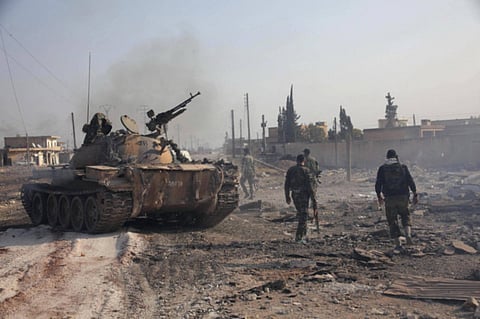Syrian chemical weapons plan adopted
Most critical toxic waste will be removed from country by December 31, 2013

Tirana, Albania: The mission to destroy Syria’s poison gas stockpile was dealt a serious blow Friday when Albania refused to host the destruction, but the global chemical weapons watchdog said it is still confident it can eradicate the weapons outside Syria by the middle of next year.
The surprise refusal by the small and impoverished Balkan country left open the question of where the Organisation for the Prohibition of Chemical Weapons would send Syria’s estimated 1,000-metric ton arsenal, which includes mustard gas and sarin.
The OPCW went ahead with a lengthy meeting and adopted a formal plan, but did not say where the deadly arsenal would go. Syria has said it wants the weapons destroyed outside the country, which is in the middle of a raging civil war
“I can’t name a country at this point but obviously there are options and there are ways in which this can be accomplished,” senior OPCW official Malik Ellahi told reporters outside the organisation’s Hague headquarters.
According to an OPCW statement, the plan calls for the “most critical” chemicals to be removed from Syria by December 31, 2013.
Albania had been considered its strongest hope, and few diplomats expected the Nato country of 2.8 million people to reject what Prime Minister Edi Rama said had been a direct request from the US.
But the plan was unpopular in Albania, and young protesters had camped outside Rama’s office to oppose it, fearing it would be a health and environmental hazard.
In a televised address from the capital of Tirana, Rama said that it was “impossible for Albania to take part in this operation” - an announcement that was greeted by a loud cheer from some of the 2,000 protesters.
Rama said he rejected the request because other countries, which he did not identify, were not prepared to be a part of the operation.
Ellahi said the close US ally had not explained why it turned down the request.
“It was a sovereign decision that Albania has taken,” he said.
In Washington, US State Department spokeswoman Jan Psaki said the decision would not hurt US-Albanian relations.
“We appreciate Albania looking seriously at hosting the destruction of chemical weapons,” she said. “The international community continues to discuss the most effective and expeditious means for eliminating Syria’s chemical weapons program in the safest manner possible.”
Albania is one of only three nations worldwide that have declared a chemical weapons stockpile to the OPCW and destroyed it. Nations including the US and Russia also have declared stockpiles, but have not yet completed their destruction.
Tirana has been an avid supporter of Washington since the US and Nato intervened with airstrikes in 1999 to stop a crackdown by Serb forces on rebel ethnic Albanians in neighbouring Kosovo.
“Without the United States, Albanians would never have been free and independent in two countries that they are today,” Rama said in an apologetic speech. “Without the United States, today there would surely be no demonstrations about chemical weapons.”
But the relationship was not enough to convince the hundreds of protesters.
“We don’t have the infrastructure here to deal with the chemical weapons. We can’t deal with our own stuff, let alone Syrian weapons,” said 19-year-old architecture student Maria Pesha, among the protesters camped out overnight outside Rama’s office. “We have no duty to obey anyone on this, Nato or the US.”
Albania has had problems with ammunition storage in the past.
In 2008, an explosion at an ammunition dump at Gerdec near Tirana killed 26 people, wounded 300 others and destroyed or damaged 5,500 houses. Investigators said it was caused by a burning cigarette in a factory where some 1,400 tons of explosives, mostly obsolete artillery shells, were stored for disposal.
Wherever it happens, the destruction of Syria’s weapons will be overseen by experts from the Hague-based OPCW, which won the Nobel Peace Prize this year for its efforts to eradicate poison gas around the world.
Chemical weapons have to be either incinerated at extremely high temperatures or neutralized using other chemicals, both costly, risky and time-consuming operations that require specialist machinery.
Just getting them out of a country in the throes of war will be a major challenge, and the joint United Nations-OPCW team overseeing the destruction will need plenty of help.
“Whatever assistance and support is needed to ensure that these materials can be transported under conditions of safety and security, we expect that to be forthcoming from the international community from various sources,” Ellahi said.
Sigrid Kaag, the Dutch diplomat running the joint UN-OPCW mission in Syria, told Friday’s meeting in The Hague that her team is “conducting its business in an active war zone, in an extreme security situation with serious implications for the safety” of all personnel.
Norway has offered a cargo ship and naval frigate to help transport the chemicals.



